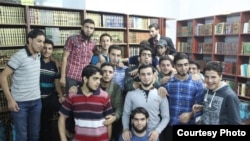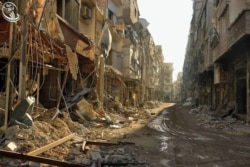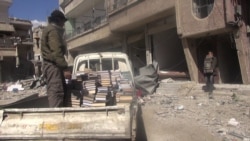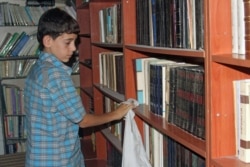Amid the bombing campaign between the Syrian regime and rebel forces in the Damascus suburb of Daraya, a small group of young students tried to bring normalcy to the chaos by creating a secret library deep underneath a bullet-ridden building.
The library was built to create a safe shelter for residents to gather and read.
For months, Mike Thomson, a British-based journalist, documented the students' efforts in his book "Syria's Secret Library: Reading and Redemption in a Town Under Siege."
"Most of the town was under sniper fire from the government soldiers who were based in high-rise buildings near the front lines," Thomson told VOA about the operation.
"They gathered these books under sniper fire and sometimes under shell fire. They brought ladders with them to climb from windows. It was a dangerous exercise they often did during the night," Thomson said.
Daraya, a suburb located 8 kilometers to the southwest of the Syrian capital, was one of the first areas to witness protests against the Syrian regime in 2011. It soon became a rebel stronghold and a major center of battle. The town suffered a brutal siege and ongoing bombardment by Russian-backed Syrian government forces and allied militias from 2012 to 2016.
Collecting books
During the middle of the siege, basic needs such as food, water and medical supplies were banned from entering the town. It was then that a group of volunteer students teamed up to stock the underground library.
For months, they stowed over 1,400 books for public access, with volumes rescued from Daraya's public library that was destroyed in a fire caused by a shelling in 2013.
"The library had become everything from a meeting place, tea room, education center, community center and a book club, where everyone discussed a book they read. Because of the lack of books, not everyone could read the same book," Thomson said.
The library contained a wide collection of local and world literature, covering areas of history, science, religion and culture, and complete sets of encyclopedias. It included popular plays of Shakespeare, books by Syrian poets like Adonis and Maram al-Masri, Agatha Christie's translated works, and a Marxist interpretation of Islam by author Muhammad Imara.
'The soul needs food'
When asked by Thomson why a group of young Syrians living under daily bombardment decided to risk their lives searching for books, Abdul Basit, a lead volunteer, said reading served as a spiritual salvation for many.
"I asked Abdul Basit, 'You are living on a cup of watery soup every day. Why aren't you out looking for food instead of books?' Abdul Basit answered, 'Like the body, the soul also needs food,'" Thomson said.
"They had hope all through this, and they still have hope, because at the end, rebel forces in Daraya had to surrender, and most of these people had to go to Idlib," he added.
The siege on Daraya ended in August 2016 after the rebels made a deal with Syria that allowed them to evacuate with their families. The agreement reportedly allowed about 700 fighters and 4,000 civilians to leave the suburb before regime forces entered.
Left behind
Basit and his team of volunteers were among those who had to flee Daraya to northern Syria, leaving the library behind. Unable to take the books, the members tried to conceal the library by blocking its entrance with pieces of shattered concrete.
Despite their efforts, Syrian government forces were able to find the makeshift library. The fate of thousands of books remains unclear, according to Basit, who has been unable to return home due to the regime's fierce control.
"I miss everything about that special place," Thomson said in his book. "It wasn't just a repository of books. It was another world, a world we shared together. And while outside was destruction and pain, inside was creation and hope. ... I felt inspired inside these walls."
With Syria going into its ninth year of conflict, hundreds of thousands of people have been killed and injured, and millions have been displaced.
Over half of all Syrians have been displaced from their homes. Forty percent of them are living in northwest Syria and over 3.6 million are refugees in Turkey, according to a report published last April by the World Health Organization.







